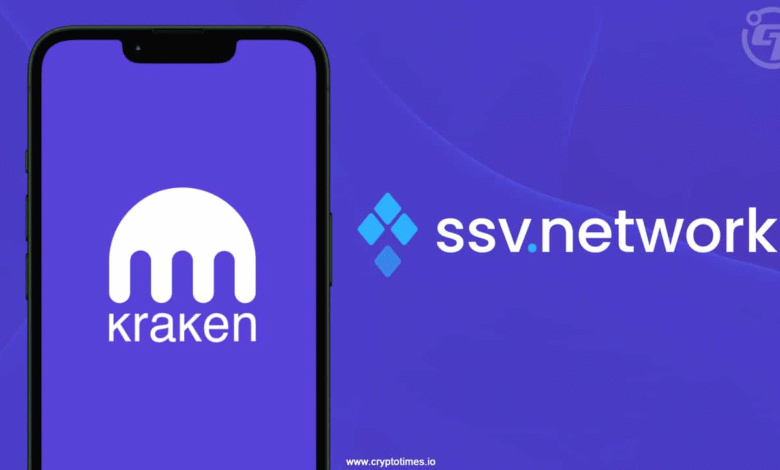Kraken DVT for Ethereum Validators: A Game Changer

Kraken DVT for Ethereum Validators marks a revolutionary advancement in cryptocurrency staking, as Kraken becomes the first major exchange to fully adopt distributed validator technology. By implementing this innovative DVT technology through the SSV Network, Kraken is enhancing its Ethereum staking services with reinforced security and reliability. This approach decentralizes validator operations by distributing validator keys across multiple independent nodes, which collaborate effectively to ensure there is no single point of failure. With Ethereum’s transition to Proof of Stake, Kraken’s integration of blockchain security solutions significantly mitigates risks, enabling users to participate in staking with confidence. As a result, Kraken sets a new standard in the realm of Ethereum staking, paving the way for a more robust and fault-tolerant blockchain ecosystem.
The introduction of Kraken’s distributed validator technology for Ethereum stake holders represents a crucial evolution in the landscape of digital asset management. By embracing decentralized validator operations, Kraken enhances the safety and efficacy of its Ethereum staking platform. This innovative approach allows for a diversification of validator functionalities, minimizing the risks associated with traditional staking methods. As Ethereum solidifies its role in the Proof of Stake ecosystem, the adoption of sophisticated blockchain security solutions becomes increasingly vital. Kraken’s commitment to delivering optimal staking experiences through advanced mechanisms positions it at the forefront of the cryptocurrency exchange industry.
What is Distributed Validator Technology and Its Benefits for Ethereum
Distributed Validator Technology (DVT) represents an innovative approach to improving the efficiency and security of transaction validation on blockchain networks, specifically within Ethereum’s Proof of Stake (PoS) consensus mechanism. By decentralizing validator functions, DVT minimizes single points of failure, effectively enhancing overall network resilience. This technology endorses the belief that diversifying validator operations leads to stronger blockchain security solutions, making it imperative for staking services like Kraken to adopt this cutting-edge mechanism.
Kraken’s integration of DVT into its Ethereum staking platform is crucial for users who seek to maximize security while earning rewards on their ETH holdings. Through the SSV Network, DVT enables the splitting of validator keys across various nodes. This means that even if one node experiences downtime or a hardware malfunction, the remaining nodes can still ensure continuity in staking services, thus protecting participants from potential slashing risks. For Ethereum validators looking for stable, secure, and efficient staking options, Kraken’s adoption of DVT outlines a clear path forward.
How Kraken Ethereum Staking is Revolutionized by DVT
The launch of DVT within Kraken’s Ethereum staking service signifies a revolutionary turning point in how validators can operate within the network. By utilizing this distributed approach, Kraken enhances uptime and improves its performance reliability. This initiative directly aligns with Ethereum’s overarching aim to foster a more decentralized network, thereby reducing vulnerabilities associated with centralized infrastructures. As more exchanges consider the innovative features of DVT technology, they too may follow Kraken’s lead, promoting a healthier Ethereum ecosystem overall.
Moreover, Kraken’s successful implementation of DVT is not just about operational excellence—it also sets a transformative standard for the entire cryptocurrency industry. By prioritizing robust security measures and decentralized operations, Kraken is positioning itself as a leader in blockchain technology adoption. For users interested in Ethereum staking, choosing Kraken means opting for a platform that leverages cutting-edge technology to support long-term network integrity, stability, and a commitment to providing reliable staking solutions.
The Impact of DVT Technology on Blockchain Security Solutions
DVT technology stands to significantly impact how blockchain security solutions are approached in the context of Ethereum staking. By decentralizing validator operations, the risk of catastrophic failures caused by single-node dependencies is drastically reduced. This decentralization not only aligns with the principles of blockchain technology but also enhances the reliability of validator performance by spreading operational risk across multiple nodes, thereby bolstering the overall integrity of the Ethereum network.
In effect, the deployment of DVT within Kraken’s staking service serves as a model for future innovations in blockchain security. With its emphasis on geographical and client diversity, Kraken is able to mitigate slashing risks more effectively than traditional staking methods. The integration of DVT reflects a proactive approach to security, appealing to investors who prioritize safety in their cryptocurrency engagements. As the landscape evolves, we can anticipate that other platforms will adopt similar distributed models to enhance their security protocols, following Kraken’s progressive path.
Understanding Ethereum Proof of Stake and Its Relation to DVT
Ethereum’s transition to a Proof of Stake model has brought significant changes to how validators operate. In this system, validators are incentivized to hold and stake their ETH rather than rely on energy-intensive mining. DVT complements this model by ensuring that validator operations are conducted efficiently and securely, allowing for seamless participation in staking while reducing risks associated with centralized control. Kraken’s embrace of this technology signals a crucial shift in how reputable exchanges engage with PoS dynamics.
The relationship between Ethereum Proof of Stake and DVT technology highlights the evolving nature of digital investments. As more users understand the benefits of staking their assets within a decentralized framework, platforms like Kraken become vital educators. By demonstrating successful DVT integration, Kraken showcases the potential rewards of engaging with Ethereum’s PoS model, encouraging more users to participate in the network while considering the importance of reducing single points of failure.
Kraken DVT for Ethereum Validators: A Game-Changer
The integration of DVT for Ethereum validators is a groundbreaking development that positions Kraken at the forefront of cryptocurrency exchanges. By adopting distributed validator technology, Kraken not only enhances the security of its staking services but also empowers individuals to engage more confidently in Ethereum POS. This game-changing move illustrates how a major player in the crypto space can leverage innovative technology to provide superior service and protection for its users.
Moreover, as DVT technology minimizes risks associated with slashing due to hardware failures, Kraken ensures that its validators can operate with improved reliability and performance. This progressive approach to validator operations reinforces Kraken’s reputation as a trustworthy platform for Ethereum staking. By investing in solutions that prioritize uptime and security, Kraken establishes itself as a leader in adopting technologies that align with the decentralized ethos of blockchain.
The Future of Ethereum Staking with DVT Integration
Looking ahead, the future of Ethereum staking with DVT integration appears promising. As more exchanges and validators adopt distributed validator technology, we can expect enhanced security protocols across the board. This trend not only benefits users as they engage with Ethereum, but also contributes to the overall health of the blockchain ecosystem. Kraken’s pioneering efforts to implement DVT within its staking infrastructure act as a catalyst for a broader shift towards more resilient blockchain practices.
Furthermore, the scalability provided by DVT allows validators to increase their operational capabilities without substantially raising risks, enabling a smoother transition to a more decentralized Ethereum. As the network continues to evolve, initiatives like Kraken’s adoption of DVT will likely shape policy and technological advancements in staking and validation, ensuring that security remains paramount while accessibility grows.
Enhancing Staking Efficiency with DVT on Kraken
DVT technology plays a pivotal role in enhancing staking efficiency on platforms like Kraken. By distributing workloads across multiple nodes, Kraken can ensure that transactions are validated promptly and reliably, which is essential for maintaining a healthy Ethereum network. This technology enables validators to handle increased staking demands without compromising performance, ultimately leading to better returns for users who stake their assets on the platform.
In addition, the shared responsibility model of DVT encourages teamwork among node operators, fostering a collaborative environment that can adapt swiftly to network changes or challenges. This improvement in operational efficiency is particularly beneficial in the rapidly evolving landscape of cryptocurrency, as it allows Kraken to scale its staking operations effectively while integrating robust security solutions. By keeping pace with these advancements, Kraken secures its status as a leading exchange committed to the best interests of its stakers.
Advantages of DVT for Staking Services at Kraken
The advantages of implementing DVT for staking services at Kraken are substantial. One significant benefit is the heightened level of security that decentralization brings to the staking process. By ensuring that no single validator is solely responsible for network security, DVT reduces the likelihood of slashing incidents, thereby safeguarding user assets. Furthermore, the diversification of nodes increases the resilience of validator operations, ensuring that they can continue functioning optimally even during adverse conditions.
Moreover, this approach creates a more inclusive and equitable environment for all Ethereum stakers, enabling a broader network of participants to engage in staking opportunities. Kraken’s adoption of DVT not only improves user trust but also reinforces its dedication to advancing Ethereum’s decentralization goals. As more users seek secure avenues for staking their ETH, Kraken’s innovative solutions position it favorably in the cryptocurrency market.
Kraken’s Commitment to Distributed Validator Technology for Ethereum
Kraken’s steadfast commitment to adopting distributed validator technology emphasizes its dedication to the evolving cryptocurrency landscape, particularly for Ethereum staking. By being the first major exchange to embrace DVT, Kraken demonstrates its proactive stance on improving blockchain security and operational reliability. This commitment not only attracts seasoned investors but also opens the door for new users who prioritize security in their staking endeavors.
Additionally, as the cryptocurrency market continues to face challenges related to security and efficiency, Kraken’s leadership in implementing DVT showcases its efforts to set industry standards. This progressive approach builds user confidence and inspires other platforms to follow suit, ultimately benefiting the Ethereum network as a whole. Through these initiatives, Kraken reiterates its role as a key player in shaping the future landscape of cryptocurrency staking.
Frequently Asked Questions
What is Kraken DVT for Ethereum Validators and how does it improve staking security?
Kraken DVT for Ethereum Validators refers to the integration of distributed validator technology (DVT) into Kraken’s Ethereum staking platform. This technology enhances staking security by decentralizing validator operations, allowing validator keys to be split into secure shares. These shares are distributed across independent nodes, which work together to perform staking duties. This significantly reduces the risks associated with hardware failures, client issues, and central points of failure, thus improving overall blockchain security.
How does the SSV Network’s DVT technology benefit Ethereum validators on Kraken?
The SSV Network’s distributed validator technology benefits Ethereum validators on Kraken by ensuring higher fault tolerance and improved uptime. By decentralizing the validator key and distributing it among multiple nodes, Kraken’s validators can continue operating effectively, even in the event of a single node failure. This not only enhances the security of Ethereum staking participants but also allows for a more resilient staking infrastructure.
What are the operational advantages of Kraken adopting DVT technology for Ethereum staking?
By adopting DVT technology for Ethereum staking, Kraken achieves significant operational advantages. The technology lowers the risk of slashing due to hardware or client-level failures through enhanced geographic and client diversity. It allows Kraken to scale its staking operations efficiently without increasing operational risks, fundamentally improving performance reliability for its validators and enhancing the overall user experience in Ethereum staking.
How does distributed validator technology align with Ethereum’s Proof of Stake goals?
Distributed validator technology aligns with Ethereum’s Proof of Stake goals by reducing the concentration of power and central points of failure within the network. By enabling a decentralized approach to validator operations, Kraken’s DVT integration supports Ethereum’s aim to enhance security and reliability across its consensus layer. This move encourages more diversified participation, essential for the long-term health and efficacy of the Ethereum ecosystem.
Can users securely participate in Ethereum staking thanks to Kraken’s implementation of DVT technology?
Yes, users can securely participate in Ethereum staking thanks to Kraken’s implementation of distributed validator technology. This integration enhances the security of staking, allowing users to earn rewards while helping to maintain the integrity of the Ethereum network. The decentralized nature of DVT reduces risks associated with traditional staking methods, thus providing a safe environment for Ethereum validators.
| Key Point | Description |
|---|---|
| Kraken Leads with DVT | Kraken is the first major exchange to fully adopt Distributed Validator Technology (DVT) for Ethereum Validators. |
| SSV Network Integration | The integration uses the SSV Network to decentralize validator operations, enhancing security and reliability. |
| Validator Key Distribution | Validator keys are split into secure shares across independent nodes, improving fault tolerance. |
| Protection Against Slashing | This approach reduces the risk of slashing due to hardware or client-level failures through diversity. |
| Operational Excellence | Kraken’s move reflects its commitment to technical excellence and improves performance reliability. |
| Support for Ethereum Network | Clients can securely participate in staking while supporting Ethereum’s goals of decentralization. |
Summary
Kraken DVT for Ethereum Validators represents a transformative advancement in cryptocurrency staking. By adopting Distributed Validator Technology, Kraken has underscored its role as a pioneer in enhancing the Ethereum ecosystem’s security and reliability for staking services. This innovative integration not only decentralizes operations critical to validator functionality but also significantly mitigates risks associated with hardware and client-level failures. With the implementation of this cutting-edge technology, Kraken is setting a new standard for other exchanges, ensuring that investors can stake their assets with confidence while actively contributing to the resilience of the Ethereum network.




